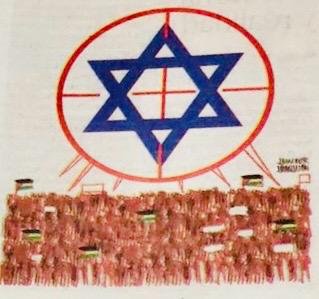Although other issues are occupying media interest, the tragedy between Israel and the Palestinian people continues, with hostages still held captive. Anti-Zionism has become a banner of struggle, and several military events are reported with headlines accusing Israel, even though the texts later refute them. Why is Israel held to standards that other countries are not? Why does the Jewish homeland receive so much media attention, while dozens of injustices and arbitrariness elsewhere go unmentioned? Is it only antisemitism?
While antisemitism is undoubtedly a fertile emotional ingredient, it is not sufficient to explain the wave of anti-Israel sentiment that is overwhelming politicians, students, media, and human rights defenders in an explosion of hatred that is spreading instead of diminishing. Many do not see themselves as antisemites, even though they wield traditional Judeophobic accusations of power, supremacy, and malevolence.
As the academic year ended in the northern hemisphere, the protests subsided; students from the expensive North American universities, along with their professors and administrators, went on summer break, taking their tents to the beaches, forests, or mountains. However, the seeds they planted have spread everywhere and have become a cause of struggle worldwide.
Any pro-Israel declaration is viewed with suspicion, and those who make such statements are canceled. The responses of the three infamous deans reflect this clearly; they would firmly repudiate attacks on African Americans or members of various sexualities, yet they remained unmoved by the student clamor for Israel's extermination. The anti-Zionist witch hunt has left many victims, so much so that the number of those dismissed exceeds those who lost their jobs during McCarthyism.
How can we understand people who, with the best intentions, raise the Palestinian flag in a cry for justice? Perhaps, after the fall of the Berlin Wall and the end of the communism-capitalism opposition, we have been left without causes to fight for. Ecology, gender and sexual diversity, feminism, and human rights provide powerful arguments for those who have lost their sense of purpose. And there's more.
The perpetrator/victim axis, born from post-colonial theories, identifies as victims those populations previously subjugated by Europeans and Americans, the "non-whites" who need to be defended and rescued. Feminism denounced the patriarchy and identified the white heterosexual male as a model of authoritarianism and supremacy. From both perspectives, the victim is enshrined as unquestionably innocent. Israel and its Jews, several decades after the Holocaust, defeated one by one the powerful Arab armies and lost their status as eternal victims to become the victors.
Communist countries and the left shifted their support to their oil suppliers, and a new generation of wealthy Islamic elites invested part of their amassed wealth in large department stores, soccer teams, and universities, fortunes that fed American universities and demanded anti-Zionist chairs, professors, and content.
By uniting these different causes, Israel became, in the academic mindset, the white, exploitative, and patriarchal state that subjugated, oppressed, and victimized the Palestinian people.
This simplistic and Manichean approach hides that the victimization, which indeed exists, is largely the work of Palestinian leaders who keep their population in eternal temporary camps to obtain economic and political support, and in the process, accuse Israel of apartheid, occupation, and genocide. Although 20% of the Arab population lives freely in Israel, decades of indoctrination have convinced academic elites of the intrinsic evil of the Jewish state. This is where antisemitic arguments flourish, even though many activists do not recognize themselves as antisemites. Their anti-Zionism has a rational basis in the oppressor/oppressed axis, but antisemitism is the emotional fuel generating anti-Israel hatred. Because, let's be clear, if their struggle were successful, "from the river to the sea" implies the destruction of the state of Israel. Islamic exterminationist terrorism is strictly religious and does not mince words or hide its anti-Jewish motivation and opposition to all "infidels" who do not revere Allah. This is what today's anti-Zionist militants support.
The struggle of activists in support of victims is commendable, and I believe they are convinced they are doing something good for the world. But in the process, they forget the injustices happening elsewhere, the Russian invasion of Ukraine and its innocent dead, other massacres and genocides with tens of thousands of victims and refugees (in Yemen, Congo, Nigeria, Syria, and the list goes on). They only become outraged when they can accuse Israel. The Israeli victims massacred in an explicit genocidal plan have no place in this narrative. They see the children burned alive, the pregnant women stabbed in their wombs, the heads decapitated and used as soccer balls, the young girls gang-raped and tortured, and the hostages as white, male, heterosexual, and patriarchal oppressors—meaning they deserved what happened to them because they were Israelis, Jews, whites, and victors.
Educated elites promote an orgy of self-hatred. Perhaps they are washing away the guilt of their predatory, genocidal, pirate, colonialist, and slave-owning European ancestors? Is this homage to radical Islamism part of the West's crisis in exonerating a shameful past? Is the only way to compensate for past guilt to undermine the future?
Some speak of the suicide of the West, of the values of democracy, republicanism, and humanism. All of them are in danger, not just the Jews.
That's why I say that anti-Zionism is not only antisemitism. It's more than that.
Published in Spanish in La Nación
